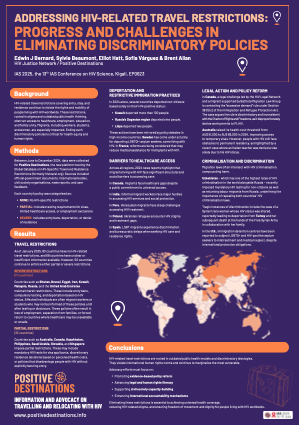A bill on combating illegal migration and protecting the health of citizens has been submitted to the State Duma. This was announced on her VKontakte page by Irina Yarovaya, Deputy Speaker of the lower house of parliament.
The bill proposes amendments to the law ‘On the Legal Status of Foreign Citizens in the Russian Federation.’ Under current regulations, migrants must undergo a medical examination within 90 days of entering Russia. If the bill is passed, foreigners will undergo a medical examination within 30 days of entry. The authors of the initiative also propose to oblige those who have arrived in the country for more than 30 days to undergo a medical examination annually.
Foreigners will be tested for dangerous infectious diseases and HIV, as well as for drug use. Medical organisations will forward information about diseases among new arrivals to Rospotrebnadzor and the Ministry of Internal Affairs ‘for prompt deportation.’
Migrants who evade medical examinations may also be deported from Russia. The amendments also propose increasing fines for migrants who evade medical examinations by more than 12 times, to 25,000-50,000 roubles, with the possibility of deportation at the discretion of the court.
Earlier, State Duma Chairman Vyacheslav Volodin reported that administrative liability is expected to be introduced for foreign citizens who evade medical examinations.
In addition, according to the speaker of the lower house, it is expected to ‘establish increased criminal liability for the forgery of official documents certifying the absence of diseases that pose a danger to others, and their circulation.’
At the end of 2024, President Vladimir Putin signed a decree requiring illegal migrants in Russia to regularise their status or leave the country by 30 April 2025.
Among the requirements for illegal migrants who want to remain in Russia were the submission of biometric data and medical examinations for drugs, infectious diseases and human immunodeficiency virus (HIV).
In addition, migrants are required to pass a test on their knowledge of the Russian language, history and laws, as well as to pay off any outstanding debts. The decree states that those who have signed a contract with the Ministry of Defence for military service will not be deported. Previous decisions on deportation, readmission, refusal of entry into Russia, undesirability of stay and reduction of the period of temporary stay in the country will not be enforced in their regard. This provision does not apply to foreigners who pose a threat to Russia’s national security.
In February last year, a public register of illegal migrants was launched in Russia. In addition, a new procedure for their expulsion from the country came into force.
Мигрантам предложили сократить срок прохождения медобследования
Законопроект о противодействии нелегальной миграции и защите здоровья граждан внесен в Государственную думу. Об этом сообщила на своей странице во «ВКонтакте» вице-спикер нижней палаты парламента Ирина Яровая.
Проектом предлагается внести поправки в закон «О правовом положении иностранных граждан в Российской Федерации». По действующим нормам, после въезда в Россию мигранты должны пройти медобследование в течение 90 дней. Если документ примут, иностранцы будут проходить медицинское освидетельствование в течение 30 дней с момента въезда. Авторы инициативы предлагают также обязать тех, кто приехал в страну более чем на 30 дней, проходить медосвидетельствование ежегодно.
Иностранцев будут проверять на наличие опасных инфекционных заболеваний и ВИЧ, а также на употребление наркотических веществ. Медицинские организации станут передавать информацию о болезнях у приезжих в Роспотребнадзор и МВД «для оперативной высылки».
За уклонение от медобследования мигранта могут также выслать из России. Поправками в том числе предлагаетсяповысить штрафы за уклонение мигрантов от медосвидетельствования более чем в 12 раз, до 25–50 тыс. руб., с возможностью выдворения на усмотрение суда.
Ранее председатель Госдумы Вячеслав Володин сообщал, что предполагается ввести административную ответственность за уклонение иностранных граждан от медосвидетельствования.
Кроме того, по словам спикера нижней палаты, предполагается «установить повышенную уголовную ответственность за подделку официальных документов об отсутствии заболеваний, представляющих опасность для окружающих, и их оборот».
В конце 2024 года президент Владимир Путин подписал указ, по которому находящиеся в России нелегальные мигранты обязаны урегулировать свой статус или покинуть территорию страны до 30 апреля 2025-го.
Среди требований к тем нелегальным мигрантам, кто хочет остаться на территории России, были указаны сдача биометрических данных и прохождение медицинского освидетельствования на наркотики, наличие инфекционных заболеваний и вируса иммунодефицита человека (ВИЧ).
Мигранты помимо этого обязаны сдать тест на знание русского языка, истории и законов России, а также погасить имеющиеся задолженности. В указе говорится, что тех, кто заключил контракт с Минобороны на прохождение военной службы, не будут депортировать. В отношении них не будут исполнены принятые ранее решения о депортации, реадмиссии, неразрешении въезда в Россию, нежелательности пребывания и сокращении сроков временного пребывания в стране. Это положение не применяется к иностранцам, которые создают угрозу для национальной безопасности России.
В феврале прошлого года в России заработал публичный реестр нелегальных мигрантов. Кроме того, вступил в силу новый порядок их высылки из страны.
